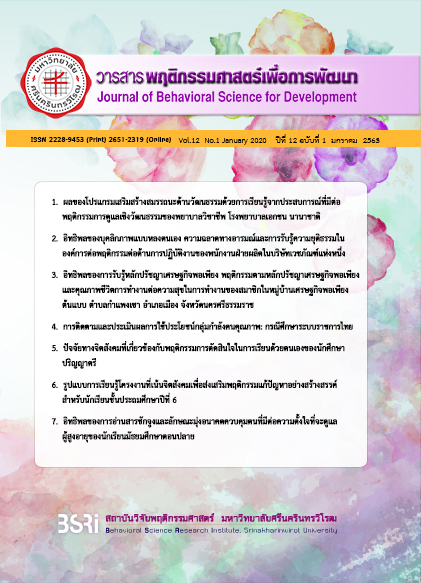ผลของโปรแกรมเสริมสร้างสมรรถนะด้านวัฒนธรรมด้วยการเรียนรู้จากประสบการณ์ที่มีต่อพฤติกรรมการดูแลเชิงวัฒนธรรมของพยาบาลวิชาชีพ โรงพยาบาลเอกชน นานาชาติ
Keywords:
สมรรถนะด้านวัฒนธรรม, โปรแกรมการเสริมสร้าง, การเรียนรู้จากประสบการณ์, พฤติกรรมการดูแลผู้ป่วยเชิงวัฒนธรรม, พยาบาลวิชาชีพAbstract
การวิจัยกึ่งทดลองครั้งนี้มีวัตถุประสงค์เพื่อศึกษาผลของโปรแกรมเสริมสร้างสมรรถนะด้านวัฒนธรรมด้วยการเรียนรู้จากประสบการณ์ที่มีต่อพฤติกรรมการดูแลเชิงวัฒนธรรมของพยาบาลวิชาชีพในโรงพยาบาลนานาชาติแห่งหนึ่ง โดยคัดเลือกกลุ่มตัวอย่างด้วยความสมัครใจ จำนวน 42 คน แบ่งเป็นกลุ่มทดลองและกลุ่มควบคุมกลุ่มละ 21 คน เครื่องมือที่ใช้ในการเก็บข้อมูลได้แก่ แบบวัดสมรรถนะด้านวัฒนธรรม แบบวัดพฤติกรรมการดูแลเชิงวัฒนธรรม โดยมีความเชื่อมั่นอยู่ระหว่าง .95, .96 ตามลำดับ วิเคราะห์ข้อมูลด้วยสถิติ Repeated Measure ANOVA ผลการศึกษาพบว่า พยาบาลในกลุ่มทดลองที่ได้เข้าร่วมโปรแกรม
มีคะแนนเฉลี่ยของสมรรถนะด้านวัฒนธรรมและพฤติกรรมการดูแลเชิงวัฒนธรรมเพิ่มขึ้นหลังทดลองและติดตามผล 1 เดือนเมื่อเปรียบเทียบก่อนทดลองอย่างมีนัยสำคัญที่ระดับ.05 ตามลำดับ และเปรียบเทียบค่าเฉลี่ยรายคู่ของสมรรถนะด้านวัฒนธรรมและพฤติกรรมการดูแลเชิงวัฒนธรรมหลังได้รับโปรแกรมและติดตามระยะเวลา 1 เดือน พบว่ากลุ่มทดลองสูงกว่ากลุ่มควบคุมอย่างมีนัยสำคัญทางสถิติที่ระดับ.05 โดยหลังทดลองมีขนาดอิทธิพลในระยะระดับปานกลางและติดตามผลมีขนาดอิทธิพลระดับสูง แต่อย่างไรก็ตามคะแนนเฉลี่ยพฤติกรรมการดูแลเชิงวัฒนธรรมของกลุ่มทดลองหลังเข้าร่วมโปรแกรมไม่แตกต่างกันเมื่อวัดหลังทดลองทันทีเปรียบเทียบกับกลุ่มควบคุม จากผลการวิจัยควรนำโปรแกรมนี้ฝึกอบรมพยาบาลที่ให้ดูแลผู้ป่วยต่างวัฒนธรรม
References
Allen, J. (2010). Improving cross-cultural care and antiracism in nursing education: A literature review. Nurse Education Today, (30)4, 314-320.
Alpers, L., M. & Hanssen, I. (2014). Caring for ethnic minority patients: A mixed method study of nurses’ self-assessment of cultural competency. Nurse Education Today, 34(6), 999-1004. DOI: 10.1016/j.nedt.2013.12.004
Amerson, R. (2010). The impact of service-learning on cultural competence. Nursing Education Perspectives, 31(1), 18-22.
Bandura, A. (1977). Social Learning Theory. New Jersey: Prentice-Hall Inc, Englewood Cliffs.
Bloom, B. (1956). Taxonomy of educational objectives, handbook I: The cognitive domain. New York: David McKay.
Campinha – Bacote, J. (2002). The process of cultural competence in the delivery of healthcare service: a model of care. Journal of Transcultural Nursing, 13(3), 181-184. DOI: 10.1177/10459602013003003
Cerezo, P. G., Galceran, M. S., Soriano, M. G., Camps, M. L., & Moral, L. J. M. (2014). Design and evaluation of an education course in cultural competence for Nursing. Social and Behavioral Sciences, 132, 262-268.
Department of Health Service Support. (2017). Rāingān sarup phonlakā rō̜dam nœ̄n ngān tām nayōbāI kānphatthanā prathēt Thai hai pen sūnklāng sukkhaphāp nānā chāt (Medical Hub) pračham pīngoppramān Phō̜.Sō̜. sō̜ngphanhārō̜ihoksip [Summary report of Thailand development policy to be an international medical hub for the 2017 fiscal year]. Retrieved from https://hss.moph.go.th/fileupload_doc/2017-12-18-1-17-37017766.pdf
Filmer, T., & Herbig, B. (2020). A training intervention for home care nurse in cross- cultural communication: An evaluation study of changes in attitudes, Knowledge and behavior. Journal of Advanced Nursing, 76, 147-162. DOI: 10.1016/j.ijnurstu.2019.06.005
Garneau, A. B., & Pepin, J. (2015). A constructivist theoretical proposition of cultural competence development in nursing. Nurse Education Today, 35(11), 1062-1068. DOI: 10.1016/j.nedt.2015.05.019
Giger, J. N., & Davidhizar, R. (2002). The Giger and Davidhizar transcultural assessment model. Journal of Transcultural Nursing, 13(3), 185-188.
Kolb, D. A. (1984). Experiential learning: Experience as the source of learning and development. Englewood Cliffs, NJ: Prentice-Hall.
Kratzke, C., & Bertolo, M. (2013). Enhancing students’ cultural competence using cross- cultural experiential learning. Journal of Cultural Diversity, 20(3), 107-111
Leininger, M. (2001). Founder's focus: Certification of transcultural nurses for quality and safe consumer care. Journal of Transcultural Nursing, 12(3), 242.
Leininger, M. M. (1991). The theory of cultural care diversity and university. In M. M. Leininger (Ed), Culture care diversity and university: Theory of nursing. New York: National League for Nursing.
Lin, C., Chang, P., Wang, L., & Huang, M. (2015). Cultural competence course for nursing students in Taiwan: A longitudinal study. Nurse Education Today, 35(12). DOI: 10.1016/j.nedt.20 15.05.023.
Luengarun, P., Wannasontad, S., & Chitviboon, A. (2012). Kānphatthanā bǣp wat phrưttikam kāndūlǣ yāng ʻư̄a ʻāthō̜n khō̜ng naksưksā phayābān [The development of nursing students’ caring behavior scales]. Journal of Nursing and Education, 5(2), 90-109.
McGuire, W. J. (1969). The nature of attitude and attitude change. In E. Aronson & G. Lindzey (Eds), The Handbook of Social Psychology (2nd ed., Vol. 3, pp. 136-314). Massachusetts: Addison-Wesley.
Oikarainen, A., Mikkonen, K., Kenny, A., Tomietto, M., Tuomikoski, A. M., Merilainen, M.,… Kääriäinen, M. (2019). Education interventions designed to develop nurses’ cultural competence: A systematic review. International Journal of nursing studies, 98(October 2019), 75-86. DOI: 10.1016/j.ijnurstu.2019.06.005
Poka, K. (2009). Kānraprū kān patibat chœ̄ng watthanatham nai kāndūlǣ phūpūai raya sutthāi khō̜ng phayābān wichāchīp rōngphayābān radap tatiya phūm sangkat krasūang sāthāranasuk [A study of professional nurses' perception on cultural congruent end of life care, tertiary hospitals under the jurisdiction of the Ministry of Public Health] (Master’s thesis). Faculty of Nursing, Chulalongkorn University, Bangkok.
Siripant, S., (2012). Kānphatthanā rūpbǣp kān rīan kānsō̜n thī nēn samatthana thāng watthanatham khō̜ng naksưksā phayābān [A development and evaluation of the teaching – learning model for enhancing cultural competency of nursing students] (Doctoral dissertation). Graduate Students, Sukhothai Thammathirat University, Bangkok.
Waite, R. & Calamaro, C. (2010). Cultural competence: a systemic challenge to nursing education knowledge exchange, and the knowledge development process. Perspectives in Psychiatric Care, 46(1), 74-80.
Wisetpholchai, B. (2013). Samatthana thāng watthanatham nai rabop bō̜rikān sukkhaphāp [Cultural competence in health care system]. Nonthaburi: Society and Health Institute.
Wu, Y., Larrabee, J. H., & Putman, H. P. (2006). Caring behaviors inventory - A reduction of the 42-item Instrument. Nursing Research, 55(1), 18-25.



